
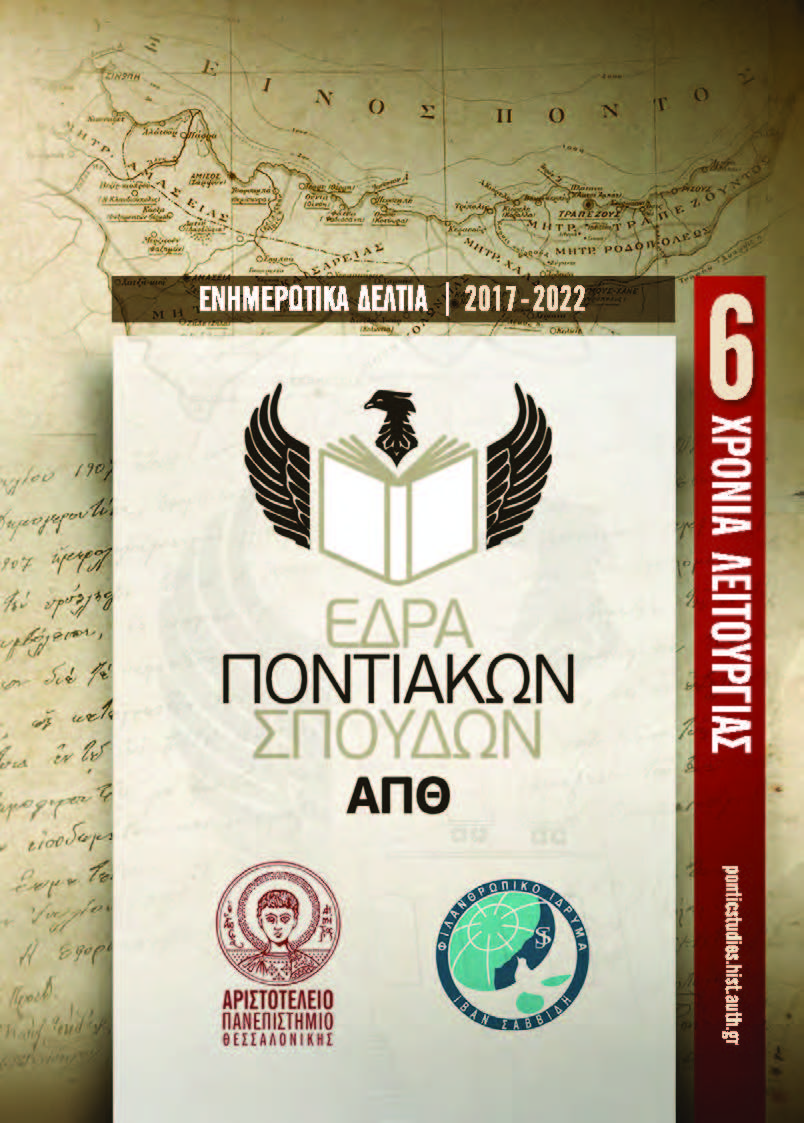


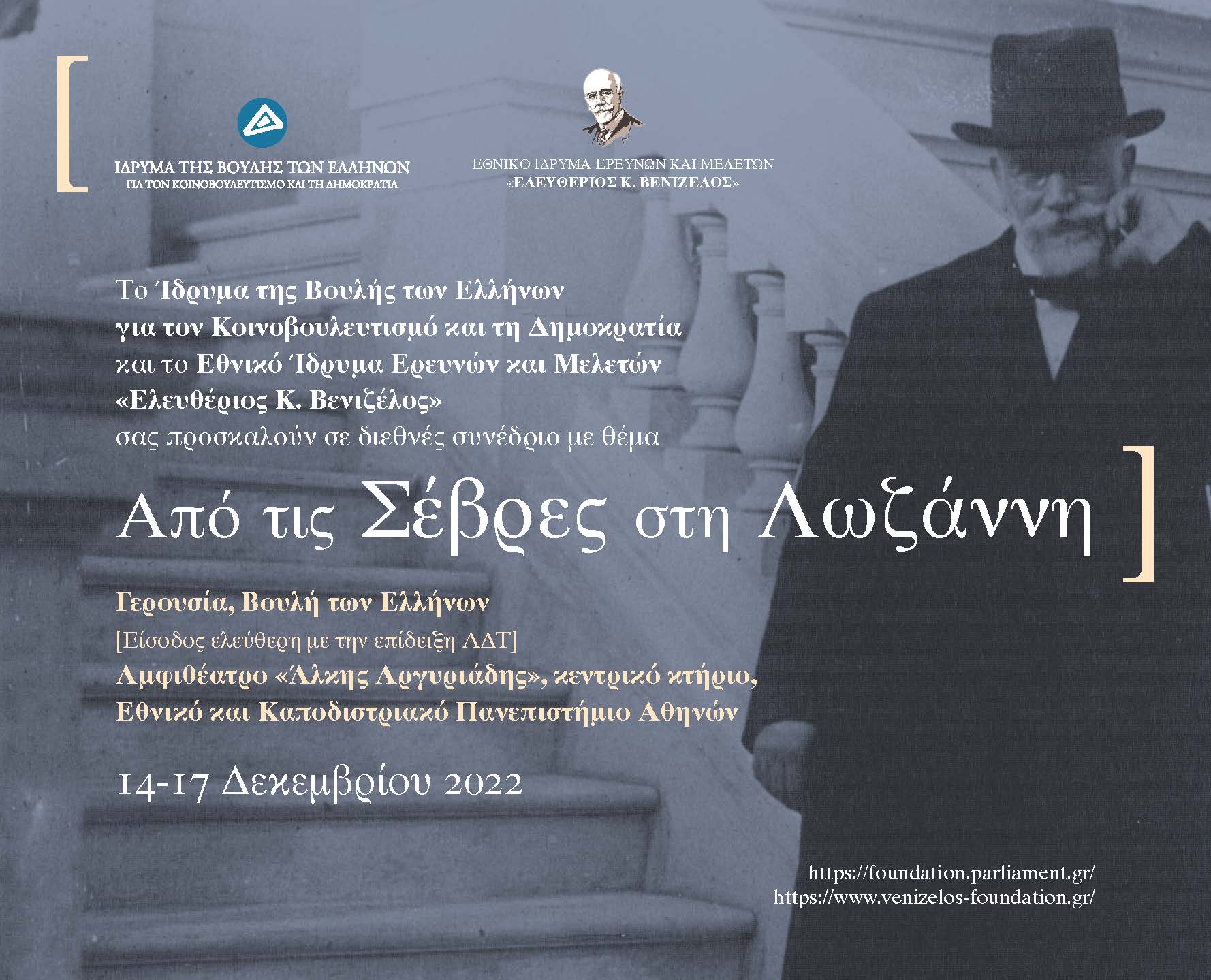
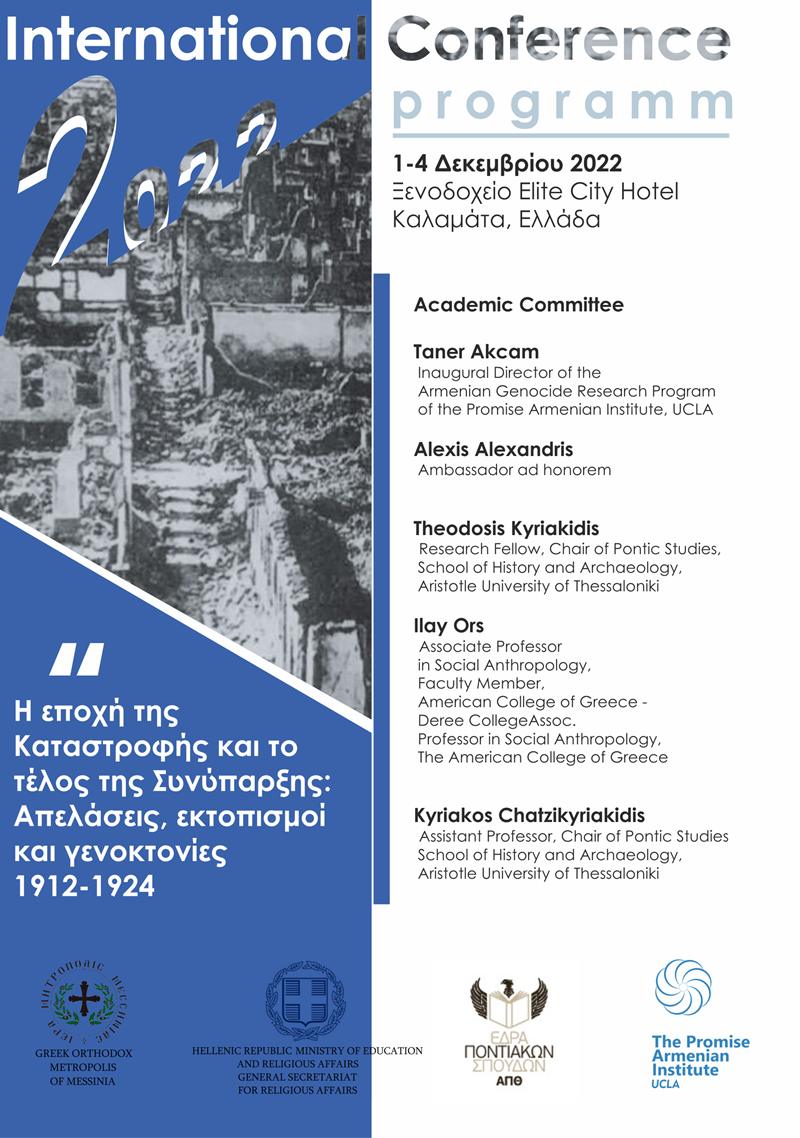
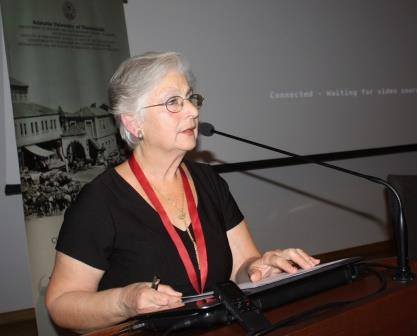
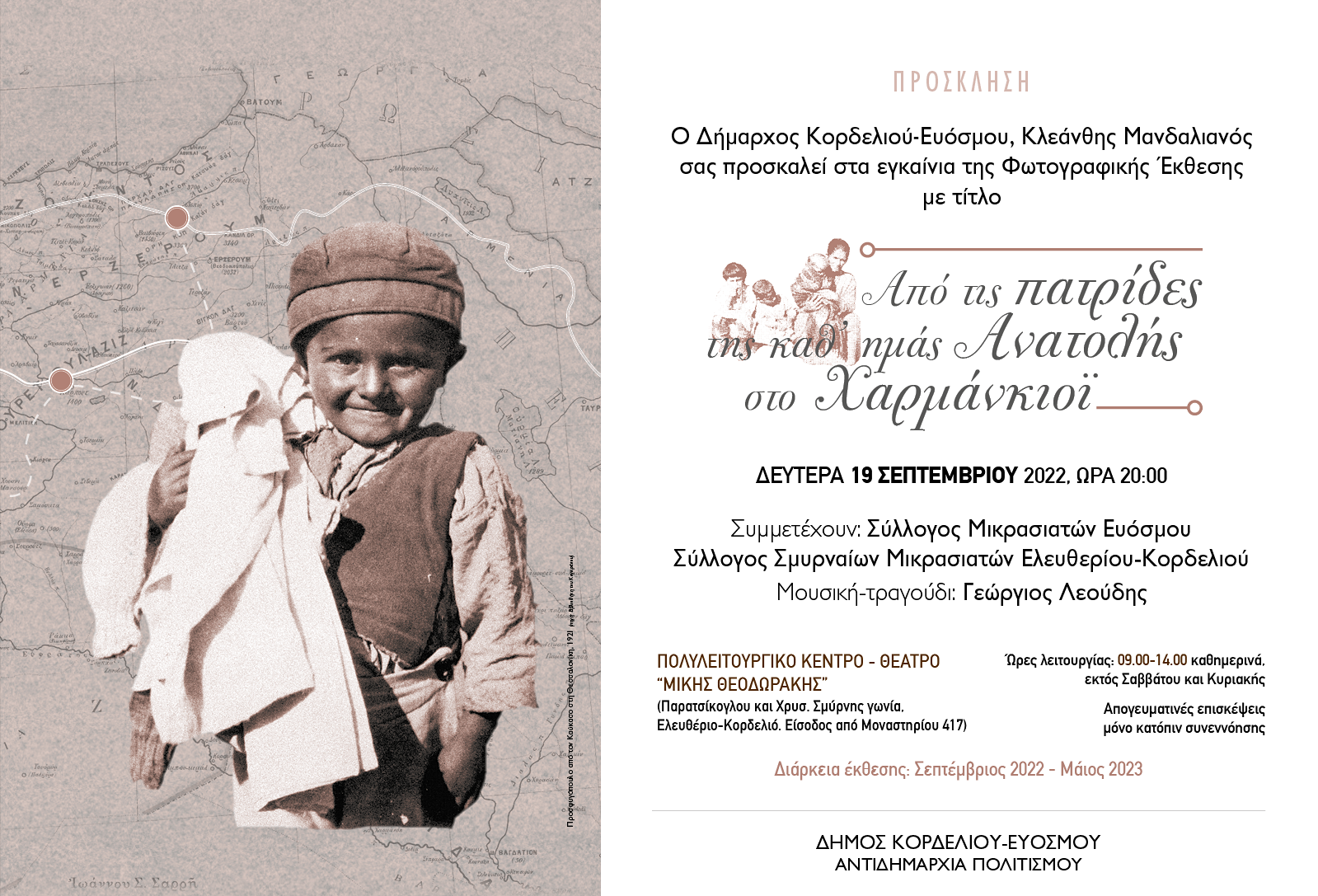
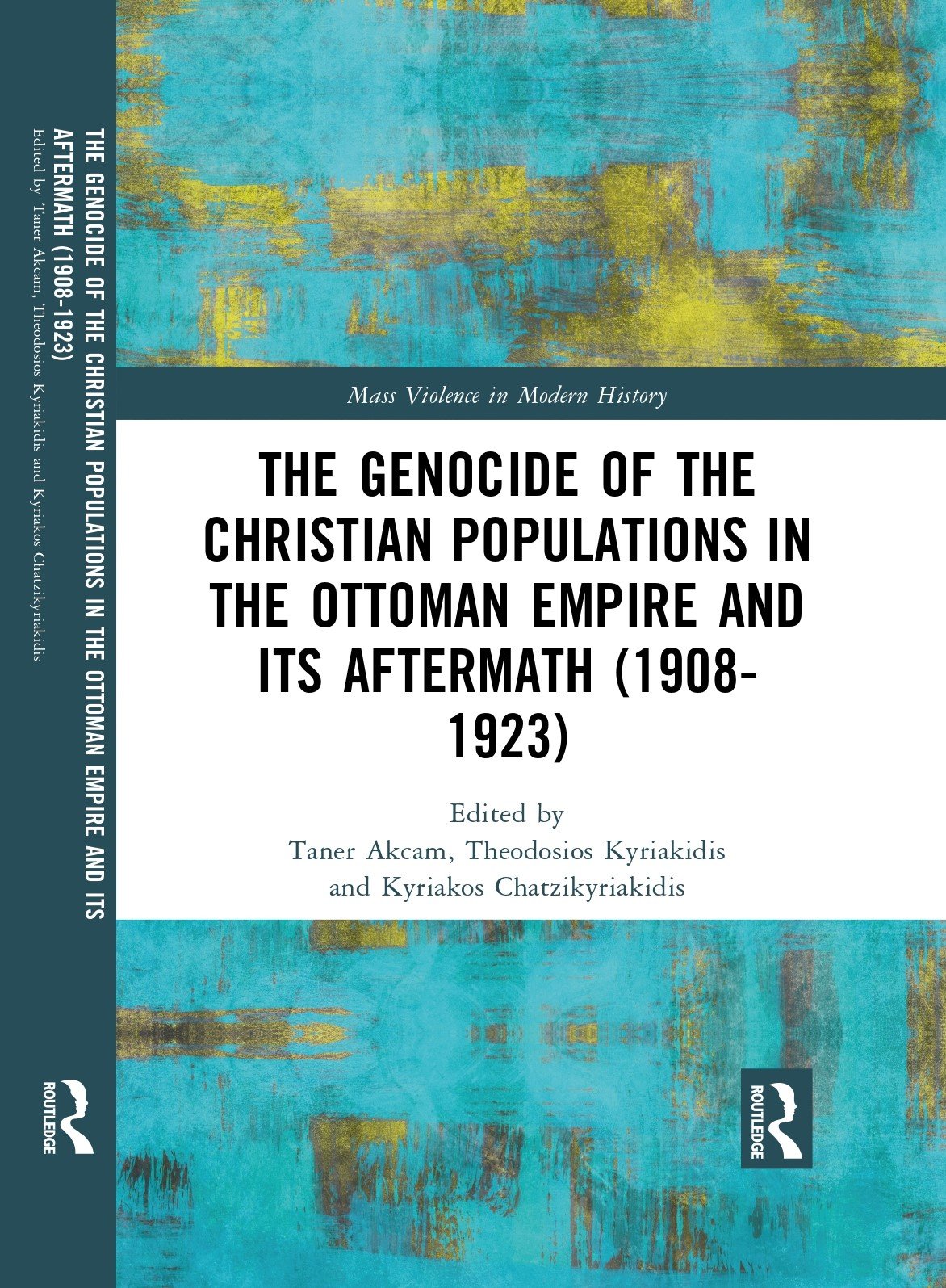
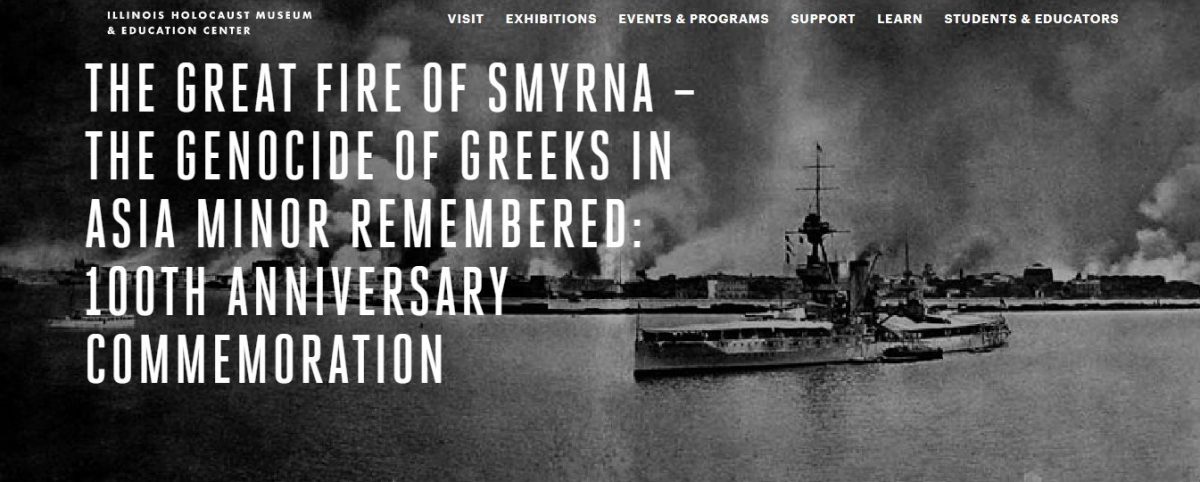




Η Έδρα Ποντιακών Σπουδών έχοντας υπόψη της τη μεγάλη ζήτηση για κατάρτιση σε σπουδές γύρω από τον Ποντιακό Ελληνισμό προχώρησε στην κατάρτιση ενός ολοκληρωμένου προγράμματος 39 ωρών/13 εβδομάδων, σε συνεργασία με το Κέντρο Επιμόρφωσης και Δια Βίου Μάθησης του Ελληνικού Ανοικτού Πανεπιστημίου. Το πρόγραμμα «Σπουδές στον Ποντιακό Ελληνισμό» έχει ως γνωστικό αντικείμενο την πολιτική, κοινωνική, οικονομική και πολιτιστική δραστηριότητα των Ελλήνων στον γεωγραφικό χώρο του Πόντου και τις προσφυγικές εγκαταστάσεις στην Ελλάδα, μέσα από τη συστηματική χρήση και κριτική προσέγγιση των γραπτών πηγών, των προφορικών μαρτυριών, της ιστορικής γεωγραφίας κ.ά. Επιπλέον, το αναφερόμενο πρόγραμμα αποσκοπεί στην υπεύθυνη ενημέρωση και ευαισθητοποίηση […]
Η Έδρα Ποντιακών Σπουδών συμπλήρωσε ήδη έξι χρόνια συνεχούς λειτουργίας στο Αριστοτέλειο Πανεπιστήμιο Θεσσαλονίκης. Εκατοντάδες φοιτητές/τριες παρακολούθησαν τα μαθήματα της στο Τμήμα Ιστορίας και Αρχαιολογίας και συμμετείχαν σε δράσεις της εντός και εκτός των πανεπιστημιακών αιθουσών. Όλοι και όλες άκουσαν για τον Ελληνισμό της καθ’ημάς Ανατολής και της Παρευξείνιας Ζώνης και ορισμένοι πραγματοποιούν πλέον μεταπτυχιακές σπουδές, εμβαθύνοντας στη μελέτη αυτού του τμήματος του Ελληνισμού. Η έρευνα σε Αρχεία εντός και εκτός Ελλάδος, με επιτόπια ή ψηφιακή αναζήτηση, η πραγματοποίηση συνεδρίων, οι σημαντικές επιστημονικές δημοσιεύσεις και εκδόσεις της, η χορήγηση υποτροφιών, οι συνεργασίες με κρατικούς φορείς και συλλόγους, η ενίσχυση […]
ΕΝΑΡΞΗ ΜΑΘΗΜΑΤΩΝ ΕΔΡΑΣ ΠΟΝΤΙΑΚΩΝ ΣΠΟΥΔΩΝ Α.Π.Θ. – ΧΕΙΜΕΡΙΝΟ ΕΞΑΜΗΝΟ Τα μαθήματα της Έδρας Ποντιακών Σπουδών (χρηματοδότηση Ιδρύματος Ιβάν Σαββίδη) στο Τμήμα Ιστορίας-Αρχαιολογίας ΑΠΘ, στο χειμερινό εξάμηνο 2023-2024: Α. Εισαγωγή στην Ιστορία του Μικρασιατικού Ελληνισμού. Ο Ελληνισμός της Ανατολής κατά τους Νεότερους Χρόνους (Τετάρτη 18.30-21.00, αίθ. 111) Β. Κοινωνική και Πολιτική Οργάνωση του Μικρασιατικού Ελληνισμού. Ο Πόντος από την κατάλυση της Αυτοκρατορίας των Κομνηνών μέχρι τις αρχές του 19ου αιώνα (Πέμπτη 18.30-21.00, αίθ. 111) Τα μαθήματα επιλογής προσφέρονται και φέτος σε φοιτητές και φοιτήτριες, όχι μόνον του Τμήματος Ιστορίας-Αρχαιολογίας αλλά και των υπόλοιπων Τμημάτων της Φιλοσοφικής Σχολής ΑΠΘ καθώς και άλλων […]
Ενημερωτικό Δελτίο Έδρας Ποντιακών Σπουδών τεύχη 10 – 11 CHAIR OF PONTIC STUDIES NEWSLETTER VOL. 9 Publish at Calameo
Συνέδριο «Από τις Σέβρες στη Λωζάννη» (14-17 Δεκεμβρίου 2022) Αθήνα Με αφορμή τη συμπλήρωση 100 ετών από το τέλος της Μικρασιατικής εκστρατείας και την υπογραφή της συνθήκης της Λωζάννης, το Ίδρυμα της Βουλής των Ελλήνων για τον Κοινοβουλευτισμό και την Δημοκρατία και το Εθνικό Ίδρυμα Ερευνών και Μελετών «Ελευθέριος Κ. Βενιζέλος» συνδιοργανώνουν διεθνές συνέδριο με […]
Η Γενική Γραμματεία Θρησκευμάτων του Υπουργείου Παιδείας και Θρησκευμάτων και η Μητρόπολη Μεσσηνίας είχαν την πρωτοβουλία οργάνωσης και πραγματοποίησης στην Καλαμάτα τού Διεθνούς Επιστημονικού Συνεδρίου: «Η εποχή της καταστροφής και το τέλος της συνύπαρξης: απελάσεις, εκτοπισμοί και γενοκτονίες, 1912-1924» (1-4 Δεκεμβρίου 2022). Το Συνέδριο στήριξαν η Έδρα Ποντιακών Σπουδών ΑΠΘ και το The Promise Armenian […]
ΨΗΦΙΣΜΑ ΤΟΥ ΤΜΗΜΑΤΟΣ ΙΣΤΟΡΙΑΣ ΚΑΙ ΑΡΧΑΙΟΛΟΓΙΑΣ ΓΙΑ ΤΟ ΘΑΝΑΤΟ ΤΗΣ ΟΜΟΤΙΜΗΣ ΚΑΘΗΓΗΤΡΙΑΣ ΑΡΤΕΜΗΣ-ΝΙΚΗΣ ΞΑΝΘΟΠΟΥΛΟΥ-ΚΥΡΙΑΚΟΥ Το Τμήμα Ιστορίας και Αρχαιολογίας της Φιλοσοφικής Σχολής του Α.Π.Θ. εκφράζει την βαθιά οδύνη του για την απώλεια της Ομότιμης Καθηγήτριας Νεοελληνικής Ιστορίας Άρτεμης-Νίκης Ξανθοπούλου-Κυριακού. Η Άρτεμις-Νίκη Ξανθοπούλου-Κυριακού υπηρέτησε πιστά το Τμήμα Ιστορίας και Αρχαιολογίας από διάφορες ακαδημαϊκές και διοικητικές θέσεις. […]
Εγκαίνια Φωτογραφικής Έκθεσης “Από τις Πατρίδες τής καθ’ ημάς Ανατολής στο Χαρμάνκιοϊ” Μια μοναδική σε συμβολισμούς, εικόνες και συναισθήματα έκθεση φωτογραφίας, εμποτισμένη με μνήμες, νοσταλγία και αγάπη για τον τόπο που έγινε η δεύτερη πατρίδα για τους ξεριζωμένους πρόσφυγες από την καθ’ ημάς Ανατολή το 1922 – το σημερινό δήμο Κορδελιού Ευόσμου – διοργανώνει η […]
ΕΚΔΟΣΗ ΠΡΑΚΤΙΚΩΝ ΤΟΥ ΔΙΕΘΝΟΥΣ ΣΥΝΕΔΡΙΟΥ “Η ΓΕΝΟΚΤΟΝΙΑ ΤΩΝ ΧΡΙΣΤΙΑΝΙΚΩΝ ΠΛΗΘΥΣΜΩΝ ΤΗΣ ΟΘΩΜΑΝΙΚΗΣ ΑΥΤΟΚΡΑΤΟΡΙΑΣ ΚΑΙ ΟΙ ΣΥΝΕΠΕΙΕΣ ΤΗΣ (1908 – 1923) Από τις σημαντικότερες στιγμές της πενταετούς λειτουργίας της Έδρας ήταν η διοργάνωση στη Θεσσαλονίκη (2019) του μεγάλου Διεθνούς Συνεδρίου της: «Η Γενοκτονία των χριστιανικών πληθυσμών της Οθωμανικής Αυτοκρατορίας και οι συνέπειές της (1908-1923)», με τη […]
100th Anniversary Commemoration The Great Fire of Smyrna – The Genocide of Greeks in Asia Minor Remembered September 18, 1:00 pm (CDT) | Hosted by Illinois Holocaust Museum The Great Fire of Smyrna (Καταστροφή της Σμύρνης) started on September 13, 1922, after the Turkish armed forces entered Smyrna, a deliberate act by the Turkish […]
CHAIR OF PONTIC STUDIES NEWSLETTER VOL. 9 Publish at Calameo
ENDOWED CHAIR OF PONTIC STUDIES
ENDOWED CHAIR OF PONTIC STUDIES
The aim of the endowed Chair of Pontic Studies, founded in May 2017, is to teach the history of the Hellenism of Pontus, incorporated into the great unity of the Hellenism of the East, during the Modern Times. Undergraduate courses contribute to the acquaintance and gradual education and “maturation” of students in matters of society, economy, ideology, coexistence with other peoples, etc. that concern the Hellenism of Pontus and the whole of the East, as well as the Black Sea Area, from the Fall of Constantinople and the abolition of the Empire of the Komnenoi until the Exchange of Populations (1923/4). It is necessary to point out that courses of History of Hellenism of the East (IEA) were offered in the past (in the 1990s and 2000s) in the School of History and Archaeology, with the emeritus professors Konstantinos Fotiadis and Artemis Xanthopoulou-Kyriakou.
In addition, the Chair provides the opportunity to attend postgraduate courses in the Department of Modern and Contemporary History of the School of History and Archaeology, an effort already begun in the spring semester 2016-2017 with the emeritus professor Artemis Xanthopoulou-Kyriakou - a university lecturer of many of the younger professors of the Department - and associate Professor Iak. Michailidis. The purpose of these lessons is no other than the creation of a "nursery" of young historians who will engage in their postgraduate and doctoral theses with the unexplored aspects of the rich history and culture of the Greeks of Pontus.
Both the teaching and research work (research projects) of the Chair of Pontic Studies are based on the financial support of the Ivan Savvidis Charity Foundation following the Memorandum of Understanding signed by the Charity Foundation and the Aristotle University of Thessaloniki (May 2016).
The Scientific Working Group of the Chair of Pontic Studies will not confine itself to its teaching and research work. High on its priorities will be the development of relationships and partnerships with other academic institutions, research centres and archives of Greece. Above all, however, what is important is the cooperation with universities, research centres and historians abroad in general, dealing with relevant scientific issues. Τhe organisation and participation in international scientific conferences in Greece and abroad, the invitation of Greek and foreign researchers for lectures, events, and lessons, the organisation of summer schools and the exchange of students, cooperation with the Armenian and Jewish communities of Thessaloniki, and of course the communication with the Greek Diaspora are also envisaged.
The aims of the Chair are of course both the study and the scientific approach as well as the awareness of the Genocide of the Hellenism of the East. Undoubtedly, important steps have already been taken in the research and documentation of this important issue, but there is still much to be done, for example, to include this issue in foreign-language publications (books and magazines), a sector in which we are lagging behind, as the references in foreign literature are scarce. The study of the presence and activation of Hellenism in Pontus and throughout Anatolia (national consciousness and intense economic and intellectual development) undoubtedly explains the hostile attitude and actions of Young-Turkish and Kemalist politics in the early 20th century. A policy that affected not only Greeks, Armenians and all Christians in Asia Minor, but also Muslim-non-Turkish populations in the same region.
